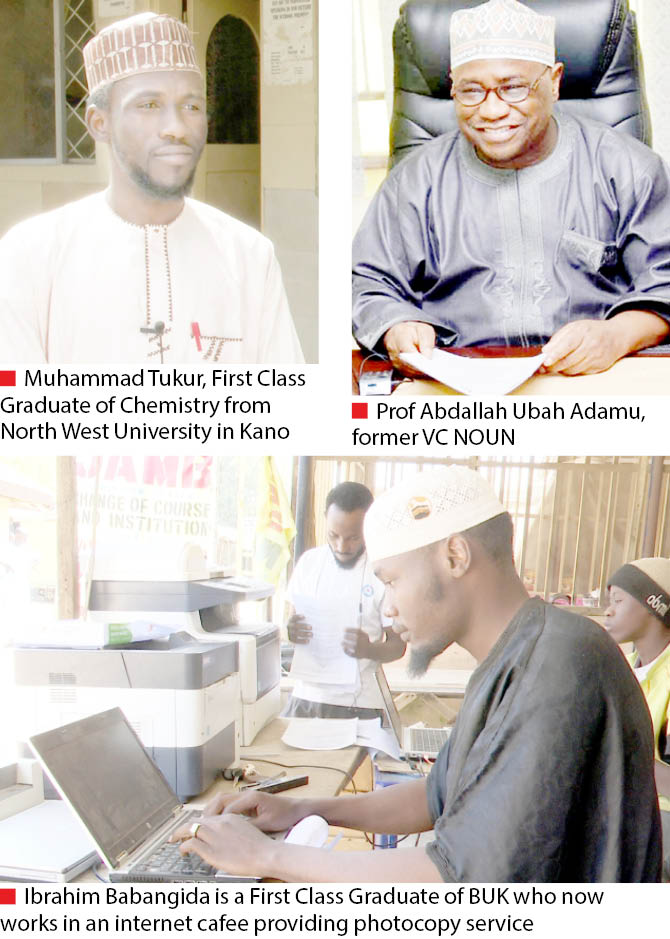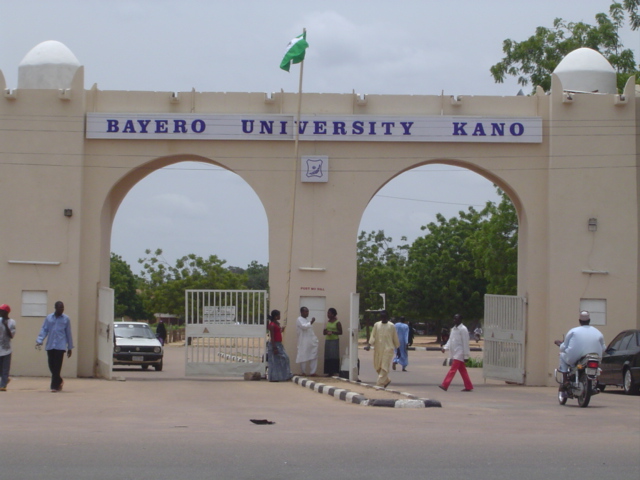From Danbare, a remote area in Ungogo Local Government Area of Kano State, Ibrahim Babangida nurtured the dream to not only pursue an education but stand out and eventually become a university professor. Through menial and part-time jobs, he self-sponsored a university education at the Bayero University Kano (BUK) and in 2019, graduated as the best student of the department of Agricultural Engineering, with a CGPA of 4.60, in spite of financial hurdles and life-threatening health challenges.
Babangida later secured a foreign scholarship, and in 2021, earned a distinction in Masters of Technology in Renewable Energy from Mewar University, India. He now works as an internet café shopkeeper, within the premises of BUK; the same university he graduated as one of the best students.
Babangida’s dream of becoming a lecturer has been dashed by a system that failed to reward first-class graduates. “I still have hope in the future,” he said to our correspondent, during an interview in the cafe where he provides typing, photocopy and printing services. Ibrahim Babangida, is one of hundreds of first-class graduates in Nigeria who have been relegated to petty businesses for survival.
As Nigeria continues to lose its best brains to foreign countries, the country’s public universities snub-away potential scholars who graduated as the best among their peers. Graduates of first-class honour degrees are at the top of their class, with an average of 70 percent or more overall. They are viewed as potential scholars and expected to pursue further academic studies. However, many of them find it difficult to secure jobs and are denied the opportunity to work for the tertiary education system that produced them.
- Bayelsa gov’ship: Petroleum minister, Sylva resigns
- Nigeria records 82,000 maternal deaths annually – UNICEF
“First class graduates of any Nigerian university are people who have outstanding achievement, are very intelligent, very clever, much focused and very good. And to be frank, these are the kind of materials needed to run the universities, people who are highly motivated,” said a former Vice Chancellor of the National Open University of Nigeria (NOUN), Prof. Abdallah Ubah Adamu.
A sample of six federal universities, one from each of the six geo political zones in Nigeria, reveal that no fewer than 1,617 first-class graduates were produced in the last three academic sessions.
Data analyzed by Daily Trust Saturday revealed that the University of Lagos, in the South West, produced 797 first-class graduates within the last three academic sessions while Bayero University in Kano, North West, produced 304 first-class graduates within its last three academic sessions. The University of Jos, in the North Central, produced 106 first-class graduates while in the North East, the University of Maiduguri produced 78 first-class graduates in the last three sessions. In the South East, University of Nigeria, Nsukka, produced 226 first-class graduates and University of Port Harcourt, in the South South, produced 106 first-class graduates in their respective last three academic sessions.
Though this paper could not authenticate if any first-class graduate has been injected into the tertiary education system within the said period, worried by the growing number of unemployed first-class graduates, the House of Representatives had in 2022 urged the Ministry of Education to liaise with relevant government agencies to ensure their employment.

Retaining first-class graduates will tackle strikes – Education Ministry
Nigeria’s Ministry of Education argues that the retention of first-class graduates will solve the manpower challenges in the universities and adherently resolve the periodic crisis between the Academic Staff Union of Universities (ASUU) and the Federal Government.
The union has constantly embarked on strike actions as a result of government’s failure to meet some of the union’s demands which include revitalization funds for universities, release of earned allowances for university lecturers, deployment of the University Transparency Accountability System (UTAS) for the payment of salaries and allowances of lecturers.
“The retention of the best brains will solve the manpower challenges every university will have. This manpower requirement is a question of earned academic allowances which in simple terms means payment of excess workload,” said Ben Bem Goong, the Director, Press and PR department of the Federal Ministry of Education.
“If you retain the best of graduates, it means that year in and out, you will have at least one or two graduates of every department and the issue of excess load will no longer arise. Don’t forget, earned academic allowances have been one of the basic issues cited by the ASUU virtually in all the strikes they had over the years, earned academic allowance is an issue,” he said.
“Go back to the history of ASUU strikes, every strike that ASUU embarked upon, unpaid academic allowance was part of the reasons. So, if you return to that, it means that is going to be sorted out,” he said.
FG’s embargo on employment to blame – Former VC
While continuing the struggle for survival, Ibrahim Babangida’s passion to teach and share knowledge is demonstrated in his continued dedication to tutoring young students to help them excel in their academic endeavours.
Like Babangida, Muhammad Tukur, a first-class graduate of Chemistry from North West University Kano was hoping to teach in the university after obtaining his master’s degree in 2021. He now teaches in a private secondary school in Kano.
“My aspiration has been to become a lecturer in my department. If I can remember, right from my 100L, most of our lecturers motivated us to graduate with first class. As pioneer students, they assured us that we would be retained by the university and that motivated me to graduate with a first-class,” he said.
But Prof. Abdallah Ubah Adamu says Tukur’s predicament could be linked to the Federal government’s employment embargo.
In 2020, the Federal Government placed an embargo on all recruitment into its Civil Service to maintain the workforce and stop the increase in the size of the nominal roll. However, in 2021, the House of Representatives urged the government to lift the embargo in order to tackle rising idleness among Nigerians.
“Not offering jobs to first-class graduates is not necessarily a policy of the universities,” said Prof. Adamu who explained that the government’s restriction of employment regardless of grade is why many first-class graduates are unable to gain employment into the tertiary education system.
“It is a national policy. There is a restriction on employment because of IPPIS and all that. So, even if they (universities) want to do that, the trouble that they have to go through in order to get just a slot for one person is too much,” he said.
The former vice chancellor however said it will take a rigorous process for a university to employ one first-class graduate. “You have to go to the office of the Accountant General of the Federation, you have to write to the NUC, you have to write to the Federal Character Commission, I mean, there are so many things you have to do in order to employ just one person. So, they (universities) feel like it is simply not worth it,” he explained.
Government should consider policy on retaining first-class graduates – NUC
Through review of official public documents of the National Universities Commission, Daily Trust gathered that there is no existing government policy for the retention of first-class graduates in Nigeria. The NUC, which works to improve the quality of Nigeria’s university education, however stated that the retention of first-class graduates will help the system grow better.
“The first-class graduates are supposed to be retained because the university as it is, is an elitist system whereby, they would be able to help the system grow better because they were trained solidly in the enterprise of knowledge,” said the acting Director of Public Affairs of the NUC, Haruna Lawal Ajoh.
“Universities are autonomous, and so hire and fire without the commission’s interference,” he said, and urged the government to consider a policy for the retention of the best graduates, in order to help the universities grow and develop.

 Join Daily Trust WhatsApp Community For Quick Access To News and Happenings Around You.
Join Daily Trust WhatsApp Community For Quick Access To News and Happenings Around You.


